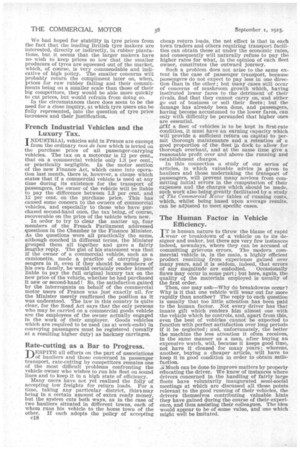The Human Factor in Vehicle Efficiency.
Page 2

If you've noticed an error in this article please click here to report it so we can fix it.
IT is human nature to throw the blame of rapid wear or breakdown of a vehicle on to its designer and maker, but there are very few instances indeed, nowadays, where they can be accused of committing grievous errors. The modern commercial vehicle is, in the main, a highly efficient product resulting from experience gained over many years, and it is seldom, indeed, that errors of any magnitude are embodied. Occasionally flaws may occur in some part ; but here, again, the quality of the materials employed is usually of the first order.
Then, one may ask—Why do breakdowns occur? Why is it that one vehicle will wear out far more rapidly than another? The reply to each question is usually that too little attention has been paid to the human factor. Not every driver has that innate gift which renders him almost one with the vehicle which he controls. and, apart from this, even the best of vehicles cannot be expected to function with perfect satisfaction over long periods If it be neglected ; and, unfortunately, the better the machine the less attention it often receives, In the same manner as a man, after buying an expensive watch, will, because it keeps good time, not have it cleaned for many years ; whereas, another, buying a cheaper article, will have to keep it in good condition in order to obtain satisfaction.
S Much can be done to improve matters by properly educating the driver. We know of instances where drivers concerned in the handling of fairly large fleets have voluntarily inaugurated semi-social meetings at which are discussed all those points relevant to the good running of their vehicles, the drivers themselves contributing valuable hints they have gained during the course of their experience, and thus assisting their colleagues. The idea would appear to be of some value, and one which might well be imitated.




























